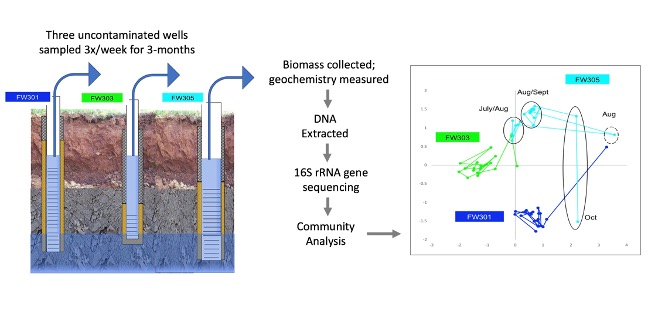 Zelaya, A.; A. Parker, K.L. Bailey, P. Zhang, J. Van Nostrand, D. Ning, D.A. Elias, J. Zhou, T.C Hazen, A.P Arkin and M.W. Fields (2019) High spatiotemporal variability of bacterial diversity over short time scales with unique hydrochemical associations within a shallow aquifer. Water Research. [doi]:1016/j.watres.2019.114917{PMID}:31387058 OSTI:1607016
Zelaya, A.; A. Parker, K.L. Bailey, P. Zhang, J. Van Nostrand, D. Ning, D.A. Elias, J. Zhou, T.C Hazen, A.P Arkin and M.W. Fields (2019) High spatiotemporal variability of bacterial diversity over short time scales with unique hydrochemical associations within a shallow aquifer. Water Research. [doi]:1016/j.watres.2019.114917{PMID}:31387058 OSTI:1607016
Freshwater resources are becoming jeopardized at alarming rates. Full assessment of uncontaminated groundwater composition, both biotic and abiotic components, over space and time is necessary to establish expected variability over both short- and long-term scales. Without such baselines, observed changes to groundwater composition could be erroneously attributed to anthropogenic effects or other disturbance events. This study showed for the first time that the groundwater composition of an uncontaminated aquifer varies dynamically and uniquely over short time scales (days) and that each of the wells had a unique ‘core’ bacterial community. The different abundant and rare OTUs contributed to community dissimilarity respective to each well but the homogenous selection was the dominant ecological force calculated for each well. VAR models suggested that DO, Cl-, ORP, and conductivity had Granger-causality with OTU richness.
This study contributes to ENIGMA’s new technologies and analyses to better characterize bacterial diversity with respect to key hydrological parameters at our field site; where Granger-causality analysis showed relationships between species richness and hydrochemistry. The bacterial community of a given well was >50% dissimilar to any other tested well and time point. Functional gene diversity as measured with GeoChip remained relatively constant.
